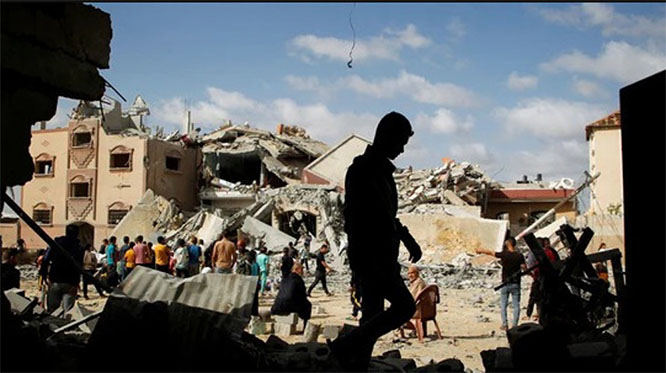
Jerusalem, Nov 23: Israel said a four-day Gaza truce and hostage release will not start until at least Friday, stalling a breakthrough deal to pause the war with Hamas.
Israeli national security adviser Tzachi Hanegbi indicated the release of at least 50 Israeli and foreign hostages held by Hamas was still on track, but would not happen on Thursday as expected.
“The contacts on the release of our hostages are advancing and continuing constantly,” he said in a statement.
“The start of the release will take place according to the original agreement between the sides, and not before Friday.”
A second Israeli official said that a temporary halt in fighting would also not begin on Thursday.
The delay is a hammer blow to families desperate to see their loved ones return home, and to two million-plus Gazans praying for an end to 47 days of war and deprivation.
The complex and carefully choreographed deal saw Israel and Hamas agree a four-day truce, during which at least 50 hostages taken in the Palestinian resistance group’s October 7 operation would be released.
For every 10 additional hostages released, there would be an extra day’s “pause” in fighting, an Israeli government document said.
Three Americans, including three-year-old Abigail Mor Idan, were among those earmarked for release.
In turn, Israel would release at least 150 Palestinian women and children and allow more humanitarian aid into the besieged coastal territory after weeks of bombardment and heavy fighting.
It was not immediately clear what caused the delay, which came after weeks of talks involving Israel, Palestinian militant groups, Qatar, Egypt and the United States.
Qatari foreign ministry spokesman Majed Al-Ansari said Thursday that implementation of the accord “continues and is going positively.”
“The truce agreement that was reached will be concluded in the coming hours,” he said.
The agreement has been approved by Hamas leaders and by Israel — despite fierce opposition from some within Prime Minister Benjamin Netanyahu’s right-wing government.
Minister for National Security Itamar Ben-Gvir described the deal as a “historic mistake” that would embolden Hamas and risk the lives of Israeli troops.
Netanyahu has backed the agreement with Hamas, but vowed the truce will be temporary and will not end the campaign to destroy Hamas.
“We are winning and will continue to fight until absolute victory,” he said on Wednesday, vowing to secure Israel from threats emanating from Gaza and Lebanon, home to Iranian-backed Hezbollah.
Tensions rose on Israel’s northern border early Thursday, after Hezbollah said five fighters, including the son of a senior lawmaker, had been killed.
Since the Israel-Hamas war began on October 7, the frontier between Lebanon and Israel has seen almost daily exchanges of fire, raising fears the Gaza war fuel a region wide conflagration.
Israel’s army said in statements Wednesday evening that it had struck a number of Hezbollah targets, including a “terrorist cell” and infrastructure.
In Washington, the White House said President Joe Biden had spoken to Netanyahu on Wednesday and “emphasized the importance of maintaining calm along the Lebanese border as well as in the West Bank.”
The White House has pressed Israel not to escalate clashes with Hezbollah, for fear of sparking a war that could drag in US and Iranian forces.
Biden also spoke to the leaders of Qatar and Egypt Wednesday, as he pushed for the truce to be “fully implemented” and to “ultimately secure the release of all hostages.”
Families on both sides grappled with a lack of clarity over how the releases would unfold.
“We don’t know who will get out because Hamas will release the names every evening of those who will get out the next day,” said Gilad Korngold, whose son and daughter-in-law are being held in Gaza along with their two children and other relatives.
Israel’s list of eligible Palestinian prisoners included 123 detainees under 18 and 33 women, among them Shrouq Dwayyat, convicted of attempted murder in a 2015 knife attack.
“I had hoped that she would come out in a deal,” her mother, Sameera Dwayyat, said, but added that her relief was tempered by “great pain in my heart” over the dead children in Gaza.
In Khan Yunis, southern Gaza, displaced Palestinians remained skeptical about the Israel-Hamas deal.
“What truce are they talking about? We don’t need a truce just so aid can come in. We want to go home,” said Maysara Assabagh, who fled northern Gaza for a hospital that now shelters about 35,000 displaced people.
Large parts of Gaza have been flattened by thousands of air strikes, and the territory faces shortages of food, water and fuel.







Comments
Add new comment